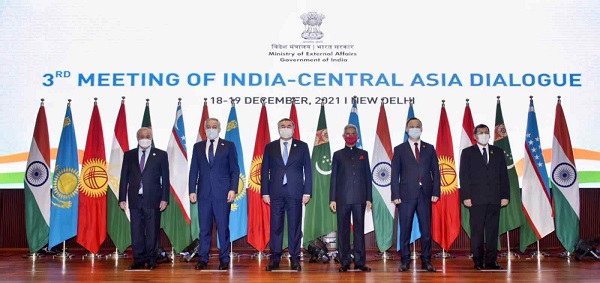
New Delhi, (Samajweekly) India and the five Central Asian countries on Sunday discussed the current situation in Afghanistan and decided to continue to provide immediate humanitarian assistance to the people of the country.
At the third India-Central Asia Dialogue held here, the External Affairs Ministers of India, Kazakhstan, Kyrgyz Republic, Tajikistan, Turkmenistan, and Uzbekistan discussed the current situation in Afghanistan and its impact on the region.
In a joint statement, the six countries reiterated strong support for a peaceful, secure and stable Afghanistan while emphasising the respect for sovereignty, unity and territorial integrity, and non-interference in its internal affairs.
The ministers also discussed the current humanitarian situation and decided to continue to provide immediate humanitarian assistance to the Afghan people.
They reaffirmed the importance of UNSC Resolution 2593 (2021) which unequivocally demands that Afghan territory not be used for sheltering, training, planning or financing terrorist acts and called for concerted action against all terrorist groups.
The Ministers also agreed to continue close consultations on the situation in Afghanistan.
“While taking note of the outcome document of the Delhi Regional Security Dialogue of November 10, 2021, Ministers noted that there is a broad ‘regional consensus’ on the issues related to Afghanistan, which includes formation of a truly representative and inclusive government, combating terrorism and drug trafficking, central role of the UN, providing immediate humanitarian assistance for the Afghan people and preserving the rights of women, children and other national ethnic groups,” the joint statement said.
The Ministers also emphasised that interaction in the fields of defence and security constitutes an important element of India-Central Asia cooperation. In this regard, they noted the importance of holding regular consultations among the National Security Councils of India and the Central Asian countries in the fight against terrorism and other emerging challenges in the region.
“The Ministers condemned terrorism in all its forms and manifestations and reiterated that providing safe haven, using terrorist proxies for cross-border terrorism, terror financing, arms and drugs trafficking, dissemination of a radical ideology and abuse of cyber space to spread disinformation and incite violence, goes against the basic principles of humanity and international relations,” the statement said.
They stressed that perpetrators, organisers, financiers and sponsors of terrorist acts must be held accountable and brought to justice in accordance with principle of “extradite or prosecute”. In this context, they called for early adoption of the UN Comprehensive Convention on International Terrorism.
“They called on the international community to strengthen UN-led global counter-terrorism cooperation and fully implement the relevant UNSC resolutions, Global Counter-Terrorism Strategy and FATF standards,” it said.









